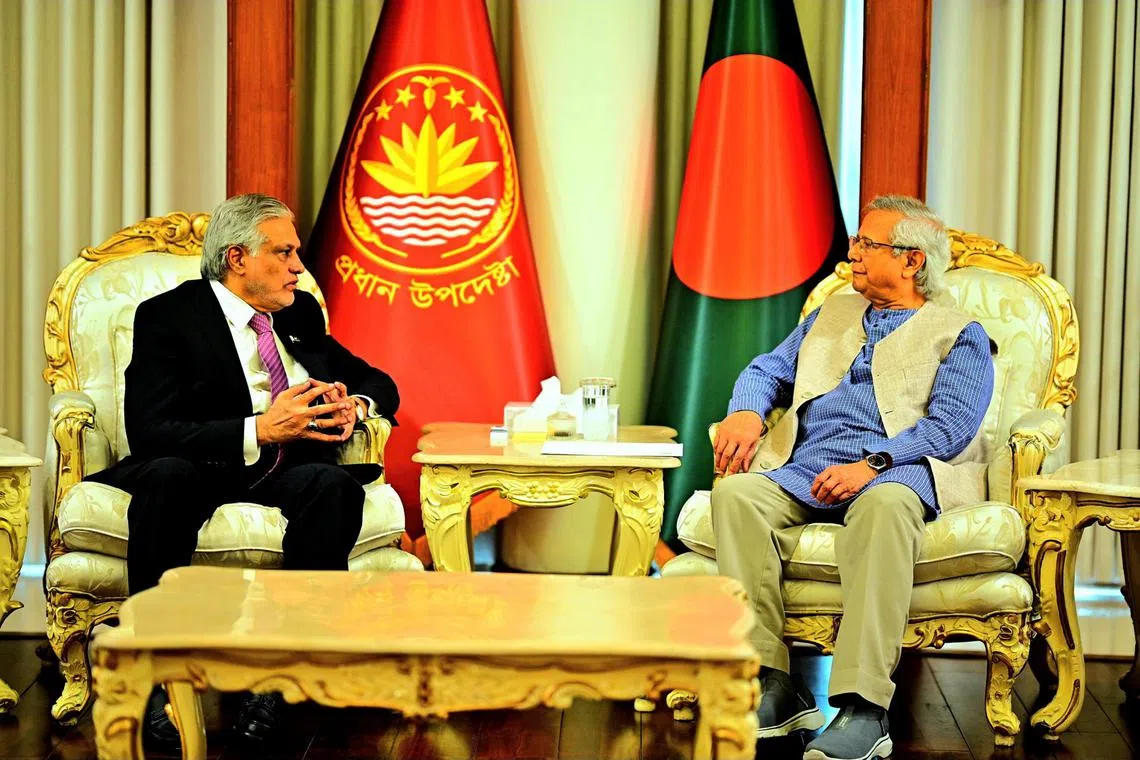News analysis
India watches with caution as Dhaka and Islamabad reset ties
Sign up now: Get insights on Asia's fast-moving developments

Pakistani Deputy Prime Minister and Foreign Minister Mohammad Ishaq Dar (left) meeting Professor Muhammad Yunus, chief adviser of Bangladesh, during his recent visit to Dhaka.
PHOTO: FOREIGN OFFICE PK/X
- Bangladesh and Pakistan relations are improving after Sheikh Hasina's ouster in 2024, with Pakistan offering scholarships and aid, described by Ishaq Dar as helping a "long-lost brother."
- Both countries are pursuing deals, including visa-free travel for officials and increasing trade, with Pakistan planning direct flights after a seven-year suspension that began in 2018.
- Despite warming ties, issues remain, including Bangladesh seeking a formal apology for the 1971 atrocities, and India is wary of growing Bangladesh-Pakistan-China cooperation.
AI generated
NEW DELHI – The Indian government is already caught in a bind over its souring ties with the United States, its largest trading partner. Now India has another reason to feel nervous: a thaw in ties between Pakistan and Bangladesh
Relations between Islamabad and Dhaka have long been strained, even hostile because of a difficult past.
Once part of the same country, the two nations went through a violent separation in 1971 when Bangladesh won its independence from Pakistan.
Ties between the two countries have since been bedevilled by the bitter legacy of Bangladesh’s Liberation War, especially during former prime minister Sheikh Hasina’s time in office, because of the Pakistani military’s and supporting militias’ horrific crackdown on Bangladeshi nationalists, including through mass murder and rape.
In the past year, though, ties have warmed considerably since a student-led uprising forced Ms Hasina to flee the country, ushering in an administration that is unencumbered by her regime’s widely perceived anti-Pakistan outlook.
On Aug 24, Mr Ishaq Dar, Pakistan’s deputy prime minister and foreign minister, concluded a two-day visit to Dhaka, becoming the most senior Pakistani official to land in Bangladesh in 13 years and adding further momentum to the rapprochement between Dhaka and Islamabad.
Mr Dar, who earlier in 2025 had described Bangladesh as Pakistan’s “long-lost brother”, arrived with goodwill gestures. This included 600 scholarships for Bangladeshi students and civil servants, as well as a limb replacement offer for 40 individuals injured during the 2024 anti-Hasina uprising.
Both nations announced a clutch of deals, including one on visa-free travel for their diplomats and officials, and the creation of a joint working group to enhance bilateral trade from the current low of around US$865 million (S$1.11 billion), particularly in sectors such as textiles and agriculture.
Pakistan also intends to launch direct flights to Bangladesh, more than seven years after such services were suspended in 2018.
This comes on top of a recent boost to maritime trade with Pakistani ships docking in Bangladesh, including one from Karachi that arrived in Chattogram in November 2024, marking the first direct maritime contact between the two nations since 1971.
Professor Moonis Ahmar, founder and executive director of the International Relations Academy in Karachi, told The Straits Times that Pakistan has been quick to work with the new regime in Bangladesh because it does not have a “tilt towards India”, unlike Ms Hasina’s government.
“Neither are they (the current regime) pro-Pakistan, but they are also not hostile to Pakistan. So it is a neutral position,” he said, adding that Pakistan hopes to gain some “geostrategic space” in the region by normalising its relations with Bangladesh.
Relations between Dhaka and Islamabad began warming noticeably after Ms Hasina’s government was toppled in August 2024 after 15 years in power.
It was her late father, Sheikh Mujibur Rahman, who had emerged as the rallying figure for Bangladesh’s independence movement, and Ms Hasina sought to carry on his legacy.
Her government prosecuted several of those accused of colluding with Pakistan during the 1971 war and had them hanged, prompting condemnation from Islamabad and a chill in ties. She even exploited this divide domestically, dismissing her opposition critics as “anti-liberation” and “pro-Pakistani” forces.
But Dr Muhammad Yunus, chief adviser to the current Bangladeshi interim government, has brought in a dramatic shift in the country’s foreign policy by resetting ties with Pakistan even as he plans to hand over power to a democratically elected government in Bangladesh after elections in February 2026.
He has also at the same time veered closer to Beijing, choosing China for his symbolically important first state visit in March.
The Chinese government and businesses committed US$2.1 billion in loans, investments and grants and, while in Beijing, Dr Yunus pitched Bangladesh as a potential “maritime gateway” for Chinese businesses to India’s north-eastern states, prompting concern in New Delhi.
China is also investing US$400 million to modernise Mongla Port, Bangladesh’s second-largest seaport, as part of China’s Belt and Road Initiative.
India is watching this geopolitical shift with caution. It remains wary of Pakistan making strategic inroads into its eastern neighbourhood, as well as suspicious of a potential wider alliance between these two countries and China.
Pakistan has also long been close to China, with whom it shares deep economic and defence ties.
Prof Ahmar noted there exists a “degree of warmth in Bangladesh and in Pakistan about each other”, with the potential to develop bilateral trade ties and people-to-people links, especially among their youth who “do not carry the baggage of what had happened earlier”.
Yet, the legacy of 1971 continues to be a major stumbling block, with it even being included in the Bangladeshi statement following Mr Dar’s visit. Bangladesh insists on a “formal apology” from Pakistan for its widespread atrocities during the 1971 war, described as a “genocide” by Dhaka.
Hundreds of thousands were massacred – three million according to Bangladeshi accounts – including from Bangladesh’s intelligentsia and minorities.
Pakistan has not formally apologised, but in 1974, as part of a tripartite agreement between New Delhi, Dhaka and Islamabad, it said it “deeply regretted any crimes that may have been committed” during the war.
And in 2002, when its then President and military dictator Pervez Musharraf visited Dhaka, he, too, expressed his “sincere regrets”, but these gestures have fallen short of the Bangladeshi expectation for a formal apology.
Dhaka has also sought a resolution to the long-pending division of pre-1971 shared assets amounting to US$4.5 billion, including a demand for the transfer of foreign aid meant for the Bhola cyclone that struck Bangladesh, then known as East Pakistan, in 1970, killing at least 300,000.
There is also the question of “stranded Pakistanis”, Urdu-speaking people who migrated from present-day India (then part of British India) in 1947 and settled in East Pakistan, and who remain in Bangladesh but hope to move to Pakistan.
While noting that these historical issues continue to concern Bangladesh, Professor Sk. Tawfique M. Haque, director of the South Asian Institute of Policy and Governance at North South University in Dhaka, said the current Bangladeshi administration does not want these differences to hold back the two countries from normalising ties.
Bangladesh’s desire to reset relations from the “abnormally low” level during Ms Hasina’s time in office are also linked to Dr Yunus’ attempts to revitalise regional integration in South Asia, including through the mothballed South Asian Association for Regional Cooperation (Saarc) grouping.
“We have these seven South Asian neighbours and Pakistan is one of them... So we need to have a normal relationship,” Prof Haque told ST.
Mending ties with Bangladesh is also a way for Pakistan to put pressure on India to revive the Saarc grouping and reduce its regional isolation, added Prof Ahmar.
In 2016, India had pulled out of the Saarc summit meant to be held in Islamabad after a terror attack that year in Kashmir that India blamed on Pakistan. The meeting was cancelled, and no Saarc summits have since been held.
Prof Haque noted that the challenge for Dhaka will be to demonstrate that its engagement with Pakistan does not represent a threat to India. “It is not as if Bangladesh is planning to have a kind of special coalition with Pakistan and doing something against India,” he added.
Many in India remain suspicious of the growing Bangladeshi-Pakistani ties, especially given past security-related concerns emanating from Bangladesh, particularly before Ms Hasina came to power.
For instance, in 2004, the Bangladeshi authorities seized a large consignment of illegal arms and ammunition being loaded onto 10 trucks at a jetty in Chattogram.
The weapons, allegedly brought from China by Pakistani spy agency Inter-Services Intelligence, were destined for a separatist group in India’s north-east.
Dr Smruti S. Pattanaik, a research fellow at the Manohar Parrikar Institute for Defence Studies and Analyses in Delhi, described the current regime in Dhaka as “anti-India”, raising the concern that “they may allow the Pakistanis to operate (in Bangladesh) in a clandestine manner”.
Bilateral ties between India and Bangladesh continue to be under severe strain because of Dhaka’s concerns around the presence of Ms Hasina in India, where she has sought refuge after fleeing Bangladesh. It has also flagged her party Awami League’s “growing anti-Bangladeshi activities” from India.
A harsh critic of Ms Hasina, Dr Yunus had described the day of her departure as Bangladesh’s “second liberation day”.
India, on the other hand, has been concerned over the treatment of Hindus and other minorities in Bangladesh since Ms Hasina’s ouster, as well as the ban on the Awami League ahead of elections in 2026.
Over the past year, India has also curtailed the number of visas issued to Bangladeshi nationals, and both countries have placed tit-for-tat trade restrictions.
“If this trend continues, then Bangladesh will have no other choice but to depend on China more and also probably develop closer cooperation with Pakistan,” said Prof Haque.
India and Bangladesh, he added, need to have an “open channel of discussion” so that they can discuss mutual concerns. “The problem is if you do not communicate then all this fearmongering and conspiracy theories will be built.”
There are also concerns of a wider alliance between Bangladesh, Pakistan and China, something that could prove to be a security nightmare for India, added Dr Pattanaik.
The three countries held a trilateral meeting in June, even though Bangladesh dismissed the idea of an alliance between them.
Bangladesh has also been strengthening its defence cooperation with Pakistan, and media reports have suggested that Dhaka wants to purchase 12 J-10C fighter jets from China.
These jets were deployed by Pakistan in its fight against India in May and which, Islamabad claims, helped down Indian Rafale fighter jets.
While India waits for the next democratically elected government in Dhaka so that it can work with it to normalise relations, Dr Pattanaik said New Delhi should consider increasing the number of visas for Bangladeshis, including those who come for medical treatment, as a humanitarian gesture.
“But at the same time, India should send out the message that India’s security should not, at any cost, be affected by any activities by any other country in Bangladesh,” she said.
“These red lines should be conveyed.”



